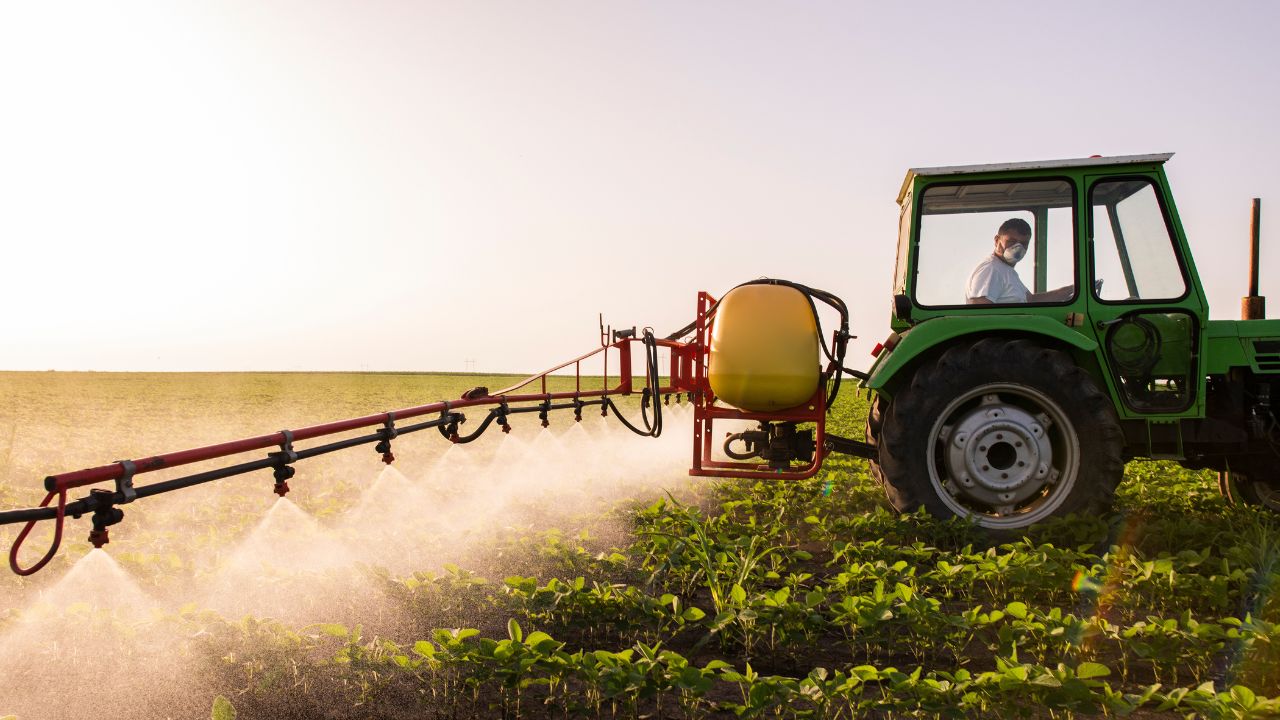What is Being Done to Mitigate the Risks of Agrochemicals?
17 Dec, 20248 minsAgrochemicals or agrichemicals have been instrumental in transforming global agriculture ove...

Agrochemicals or agrichemicals have been instrumental in transforming global agriculture over the last century, increasing crop yields and food security. However, the widespread use of synthetic chemicals, such as pesticides, herbicides, and fertilisers, has brought unintended consequences that are becoming more apparent.
These chemicals have significant ecological and human health risks, including soil and water contamination, biodiversity loss, and chronic health problems in humans. As the world faces pressing challenges like climate change, soil degradation, and increasing demand for food, agrochemical companies must begin developing environmentally friendly solutions and encourage farmers to adopt sustainable practices to mitigate the risks associated with agrochemicals.
In this blog, we explore the shift companies and global governments are taking to mitigate the risks of agrochemicals. We’ll cover the following:
- A Shift to the Sustainable Chemical Engineering of Agrochemicals
- The Top Agrochemical Companies Investing in Sustainability
- Global Initiatives Supporting Sustainable Agrochemicals
- Agrochemicals, Precision Agriculture and AI Integration
A Shift to the Sustainable Chemical Engineering of Agrochemicals
In recent years, the engineering behind the production of various types of agrochemicals to support the agriculture sector has seen significant transformation. Due to the growing awareness of the negative environmental impacts and effects associated with human health, this transformation is heavily shifting towards the sustainable chemical manufacturing of agrochemicals.
The worldwide shift towards sustainable chemical engineering and the manufacturing of agrochemicals is evident in the market's growth. As highlighted in the Global Sustainable Agrochemicals Market Research Report: Forecast (2024-2030), the global market for sustainable agrochemicals is forecasted to rise at a CAGR of 9.02% between 2024 and 2030.
Government initiatives to promote the sustainable chemical manufacturing of agrochemicals, sustainable farming, and agricultural technological developments are driving these market estimates. Increased consumer awareness and demand for sustainable food and farming also contribute to this projection.
Sustainable agrochemicals provide an environmentally friendly alternative to traditional agricultural chemicals. These bio-based agrichemicals are being produced to align with the global population's more socially conscious and environmentally responsible attitudes.
With the ability to mitigate the chemical residues left in soil and water, sustainable agrochemicals can reduce the damage caused to wildlife, the environment and human health. These sustainable chemical products are helping to balance ecological and ethical practices while ensuring the quality of agricultural productivity and crop yields are maintained.

The Top Agrochemical Companies Investing in Sustainability
BASF
Major agrochemical companies, such as BASF, have made significant investments to back the sustainable chemical manufacturing of agrichemicals. BASF, which we discussed in our blog on the 5 Biggest Chemical Plants In The World, had sales of over $11 billion in the agrochemicals industry in 2023. As part of their global strategy, they have committed to boosting sustainable agriculture through clear and measurable targets.
In May 2024, Agriculture Post highlighted BASF’s launch of Efficon, an insecticide designed to mitigate piercing and sucking pests in Indian crops. Regarding the launch, the post quoted Dr. Marko Grozdanovic, the Senior Vice President and Global Strategic Marketing of BASF Agricultural Solutions.
Dr. Marko Grozdanovic backed BASF’s commitment to the sustainable agrochemicals market:
“(...) We are convinced that by providing farmers with effective and sustainable solutions, we can support them to meet the growing demand for food while reducing the impact on the environment.”
Bayer
Bayer is another of the top agrochemical companies deploying sustainable chemical solutions to the agriculture industry. By 2030, they have pledged to reduce the environmental impact of its crop protection by 30% globally. The concept surrounding this commitment will involve Bayer measuring the environmental footprint of applied agrochemicals per hectare of the land their products treat.
They aim to reduce the volume of chemicals used per hectare and improve the environmental profiles and efficacy of their active ingredients. In June 2023, Bayer launched CropKey, one of its sustainable practices. Using advancements in life sciences and artificial intelligence (AI), CropKey provides farmers with a new approach to protecting their crops, food security, and our planet.
Watch the video below to find out more.
Syngenta
Another of the top agrochemical companies applying sustainable practices is Syngenta. With over 300 global sustainability projects and partnerships, their four core priorities consist of:
- Helping farmers achieve higher yields with lower impacts on the environment.
- Support farmers in achieving enhanced productivity, biodiversity, climate and soil health.
- Improve rural prosperity of underserved and low-income farmers.
- Reduce the environmental impact of (Syngenta’s) operations.
In 2023, Syngenta partnered with Biotalys, a chemicals company. Inspired by Biotalys’ AGROBODY technology, their solution allows farmers to access novel technologies for sustainable agriculture.
Global Initiatives Supporting Sustainable Agrochemicals
Governments worldwide have implemented stricter regulations on the use of chemical pesticides to mitigate the risks associated with agrochemicals. These regulation changes are driven by concerns surrounding the negative impacts of agrichemicals on the environment and human health.
In certain countries, harmful pesticides have been restricted and, in some cases, banned. These regulation updates across the agrochemical market have created more opportunities for eco-friendly and bio-based chemical alternatives. The growing demand for such alternatives, combined with the need to comply with regional regulations, has also necessitated additional talent within the sector. For instance, the agrochemical industry may require more professionals in new technology development, research and development, and engineering to support the transition toward sustainable solutions.
An example of regulation changes across the agrochemical industry occurred in the US. In 2021, the Environmental Protection Agency (EPA) banned the insecticide chlorpyrifos due to its risks to human health - particularly children.
Japan’s Promotion of Sustainable Agriculture and Rural Revitalisation programme supports farmers transitioning to sustainable practices. In addition to contributing to the growing demand for bio-based agrochemicals in the region, Japan aims to cover 1 million hectares, or 25% of its farmland, with organic farming by 2050.

Europe has also taken steps to mitigate the risks associated with agrochemicals. The European Environment Agency reported that 22% of monitored rivers and lakes recorded having one or more pesticides. These 2020 statistics were cause for concern, as the levels of pesticides recorded were above the thresholds of being a risk to human health.
The EEA article also referenced a 2019 study revealing that 83% of soil contained pesticide residues. They also referred to a ‘large-scale human biomonitoring study’ conducted across five European countries between 2014 and 2021. The study found that at least two pesticides were present in the bodies of 84% of the surveyed participants. These pesticide levels were higher in children than in adults.
Due to the health risks associated with these agrochemicals, Europe has decided to take action. As part of its 2020 Farm to Fork Strategy, a core part of the European Green Deal, the European Commission proposed new regulations regarding the Sustainable Use of Plant Protection Products. These proposals from 2022 focused on reducing the risk and use of chemical pesticides by 50% and mitigating the use of hazardous pesticides by 50% by 2030.
As the EAA states, there is no one-size-fits-all solution to mitigating the risks of agrochemicals. Some proposed approaches include encouraging farmers to harness integrated pest management practices and prioritising non-chemical pest control methods. The EU also seeks to provide farmers with financial incentives and training programmes to adopt organic farming and precision agricultural practices.
There has also been international collaboration regarding the sustainable use of agrochemicals across other regions. In 2023, a $379 million initiative called the Financing Agrochemical Reduction and Management (FARM) programme was launched by the combined governments of Ecuador, India, Kenya, Laos, the Philippines, Uruguay, and Vietnam.
Spearheaded by the United Nations Environment Programme (UNEP) and funded by the Global Environment Facility (GEF), the FARM programme is focused on reducing the environmental impact of hazardous pesticides and agricultural plastics. It also aims to encourage the use of low- and non-chemical alternatives to traditional agrochemicals. Additionally, the FARM programme seeks to provide farmers with the resources and knowledge needed to transition to sustainable farming methods.
The FARM initiative aims to protect over 3 million hectares of land from degradation over its five-year programme. The programme seeks to prevent the release of over 51,000 tons of hazardous pesticides, 35,000 tons of carbon dioxide emissions, and 20,000 tons of plastic waste.

Agrochemicals, Precision Agriculture, and AI Integration
Technological advancements, such as precision agriculture and AI, are becoming prominent in the sector. Precision agriculture, including GPS-guided tractors, sensors, and drone technologies, allows farmers to apply agrochemicals to targeted areas efficiently. These innovative solutions are helping to minimise waste and reduce the volume of agrochemicals used to lessen their environmental impact.
For example, Bayer's digital farming platform FieldView allows farmers to make more informed, data-driven decisions about using agrochemicals. FieldView helps farmers in various ways, such as improving their crop performance, targeting their inputs more precisely, and planning sustainable solutions.
AI and machine learning (ML) are also shaping the future of agrochemical product development. Manufacturers are tapping into these types of automation technologies to analyse large datasets and identify patterns in crop development to create more sustainable and environmentally friendly practices.
For example, BASF is harnessing AI to support its R&D in developing sustainable agrochemical products. Their xarvio Field Manager and ONE Smart Spray technology are just two instances of how they are using AI algorithms to bring sustainable solutions to the agrochemical market.
Final Thoughts on the Use of Sustainable Agrochemicals
The shift towards sustainable agrochemicals is a significant and necessary step in the global aims to address the environmental and health risks posed by traditional chemical usage in agriculture. Major agrochemical companies like BASF, Bayer, and Syngenta are investing in greener technologies, while governments worldwide are implementing stricter regulations and promoting bio-based alternatives.
Global initiatives such as the FARM programme and advancements in precision agriculture and AI further support these sustainable agrochemical efforts. Although challenges remain, the combined focus on sustainability, innovation, and regulation is paving the way for a more environmentally responsible future in agriculture and the closely linked chemicals industry.
If you found this blog useful, read our piece about How Chemical Companies are Embracing Sustainability.
Looking to Embrace Sustainability in the Chemical Industry?
NES Fircroft offers tailored talent acquisition solutions to global chemical companies looking to embrace sustainable practices. With more than two decades of recruitment experience in the chemical industry, our specialist consultants can help connect your business to the most in-demand talent in the agrochemicals market. We can help you source and place the people capable of embedding sustainability into your operations.
Contact us today and find out how we can support you with your chemical recruitment needs.









